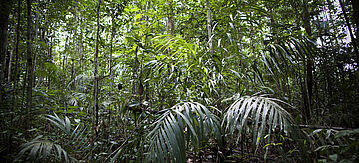The restoration of degraded forest landscape is picking up pace internationally. The Bonn Challenge on forest restoration, launched by Germany in 2011, has triggered action throughout the world.
The restoration of degraded forest landscape is gaining momentum around the globe. The Bonn Challenge on forest restoration, launched by Germany in 2011, has triggered action worldwide. Last week, shortly before the International Day of Forests on 21 March, a third international Bonn Challenge meeting, Bonn Challenge 3.0, took place in Brazil. To date, a total of 47 countries, provinces and companies have pledged to restore over 160 million hectares of forest.
Federal Environment Minister Svenja Schulze said: "Forest restoration is a central element in securing a sustainable future for our planet. Forest restoration not only helps the environment and climate, but also supports economic development and poverty eradication. More and more successful approaches are being implemented throughout the world. We want to help spread these good ideas and strategies everywhere – not just in developing and emerging countries."
The focus of last week's high-level Bonn Challenge event was on Brazil. As a particularly forest-rich state, this South American country began permanently cutting its deforestation rates in 2004. Brazil is currently pursuing a plan to restore 12 million hectares of natural vegetation by 2030.
Seven years after its launch, the Bonn Challenge has become established in Latin America, Africa and Asia. Initial steps are also being taken in the Mediterranean region and Central Asia. These regional processes foster the exchange of information and experience among participating countries. The Bonn Challenge in Brazil has demonstrated that communities and districts are important players in the long-term task of forest restoration.
At Bonn Challenge 3.0, El Salvador presented an initiative to declare 2021-2030 the UN Decade for the Restoration of Ecosystems. In the coming months El Salvador, a Bonn Challenge partner, will join with other Central American countries to propose a corresponding motion in the UN General Assembly.
As the world's largest carbon sinks, forests are vital for combating climate change. They are furthermore a key to conserving biological diversity.

